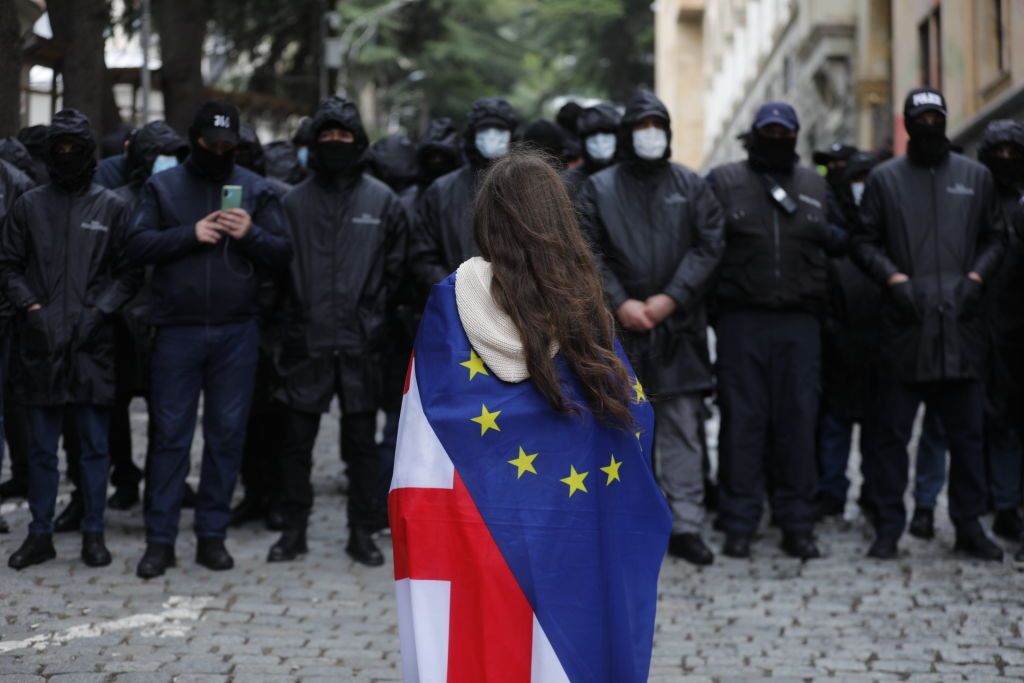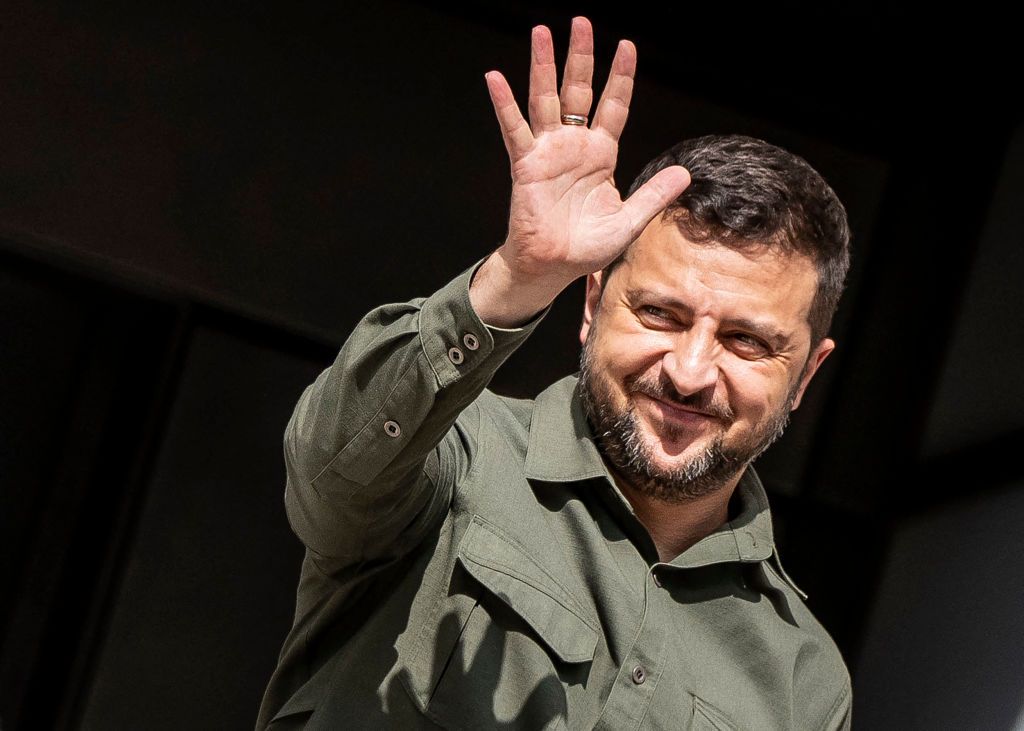Support independent journalism in Ukraine. Join the fight.
Become a member Support us just once
Earlier this month, the European Union celebrated the 20th anniversary of its largest-ever enlargement, with 10 new member states. The event was a powerful reminder of the EU's potential to promote peace and unity across the continent. But with deepening internal divisions and an increasingly unstable external environment, the euphoric idealism of 2004 seems a distant dream and the prospects for further enlargement are uncertain.
The promise of EU membership has long been considered a powerful mechanism for strengthening stability, democracy, and prosperity across the continent: the accession of Portugal and Spain in the 1980s (and the transition to democracy in both countries) demonstrated this dynamic.
However, the logic of enlargement changed with the accession of eight former communist countries (plus Malta and Cyprus) in 2004, and Bulgaria and Romania in 2007. Enlarging the single market and strengthening the foundations of democracy across Europe remained important goals.
But by welcoming Central and Eastern European countries into the European “family,” the EU was demonstrating that it had moved beyond its past of war and division. The EU's newest members welcomed the chance to break away from centuries of limbo between Russia and the West, even though, in the EU's eyes at least, Russia no longer appeared to be a major threat to its neighbors.
Opinion: Russia's Shadow Fleet strategy borrows from Iran's
Iran's recent missile attacks on Israel are a stark reminder of the petro-dictatorship's growing boldness in ignoring international norms and undermining world peace. Emboldened by Russia's brutal and indiscriminate attacks on Ukraine (targeting everything from hospitals to…) Iran…

With a war raging on Europe's doorstep, there is no question that Russia is dangerous. Just four days after the full-scale invasion in February 2022, Ukraine applied for EU membership. Driven by a sense of moral obligation rather than any real desire for further enlargement, the EU quickly granted it candidate status. Currently, nine countries, mostly in Eastern Europe, are recognized as candidates for EU membership.
However, despite its success, the 2004 “Big Bang” cannot serve as a model for future enlargement. Each accession brings challenges and requires nuanced solutions. One of the key challenges today, which challenges the traditional idea of EU enlargement, is the backsliding of democracy in some member states.
Most notably, Hungary has repeatedly clashed with the EU over the anti-democratic policies pursued by Prime Minister Viktor Orbán since returning to power in 2010. Tensions persist in Poland, where a right-wing government modelled on Orbán was replaced last year by a three-party coalition promised to strengthen democracy. Slovakia's populist-nationalist Prime Minister, Robert Fico, was recently the target of an assassination attempt.
This trend weakens EU-level decision-making, with national interests often trumping the will of the majority. For example, Orbán has repeatedly blocked EU aid for Ukraine and strengthened trade and investment ties with China at a time when other EU member states are seeking to reduce their reliance on the Chinese market. Budapest was one of three stops by Chinese President Xi Jinping during his recent visit to Europe, during which he and Orbán announced that the two countries would form an “all-weather partnership.”
 Georgian police officers guard protesters during a protest against the Russian-inspired “foreign agents” law introduced by the Georgian government in the Georgian capital, Tbilisi, May 14, 2024. (Mirian Meladze/Anadolu via Getty Images)
Georgian police officers guard protesters during a protest against the Russian-inspired “foreign agents” law introduced by the Georgian government in the Georgian capital, Tbilisi, May 14, 2024. (Mirian Meladze/Anadolu via Getty Images)
More broadly, visions for the EU's future, from the ambitious European Green Deal to tackling migration, face considerable resistance, dampening enthusiasm for further integration and enlargement. How can they accommodate 36 member states when the EU institutions are struggling to draw a common vision for 27 member states? After all, this new EU will not only be bigger, but also more diverse.
The enlargement debate has never escaped the problem of geographical determinism. However, the EU recognised the geopolitical and economic benefits of membership enlargement and sought to avoid potential conflicts by updating its accession policy to be conditional, rather than excluding countries on geographical grounds. Countries wanting to join the EU must meet certain standards in a range of areas, from minority rights to judicial independence. This helps explain why Turkey's accession process has stalled indefinitely, despite the geopolitical inevitability of its becoming a candidate country.
Will Georgia, which applied to join the EU in 2022, be more successful in meeting the conditions for EU membership? It seems unlikely now, judging by the government’s recent attempt to enact a Russian-inspired “foreign agent” law that would require civil society organizations and independent media that get more than 20% of their funding from abroad to register as organizations that “serve the interests of foreign powers.” The law was vetoed by President Salome Zourabichvili and, more importantly, sparked massive protests by a public that overwhelmingly supports EU membership, but the government seems unfazed and is trying to force the bill through.
The situation in Serbia is no better: The country has been a candidate for EU membership since 2012, but a 2023 survey found that only 33% of Serbs want to join. President Xi stopped in Belgrade during his recent European tour and signed a deal with Serbia to build a “shared future.”
Opinion: Responding to the “Zelenskyi legitimacy question”
Ukrainian President Volodymyr Zelensky's five-year term ended on May 20. For most Ukrainians, including Ukrainian constitutionalists, the path forward is clear: Zelensky should remain president until martial law is lifted and new elections are held in Ukraine. But critics…

As for Ukraine, its ongoing war with Russia is not the only obstacle to EU membership: Meeting the criteria for membership would require far-reaching economic and governance reforms, plus the country's vast agricultural sector raises competition concerns among EU farmers.
For the new, bigger EU to work, creative solutions will be needed. Many have advocated a “multi-speed Europe”, where member states move towards integration at their own speed, with a vanguard taking the lead. But in the absence of a common vision for the future – meaning not only different integration capacities but also different objectives – what is really needed is a “variable-shape Europe”, one that offers a more pragmatic approach to integration even in the face of irreconcilable differences.
The EU is now in danger of becoming, rather than a player asserting its own rights, a chessboard on which a contest between the US and China is played out. How the EU navigates the enlargement debate and whether it succeeds in modernising and streamlining its decision-making will determine whether this risk becomes a reality.
Editor's note: Copyright belongs to Project Syndicate. This article was originally published by Project Syndicate on May 23, 2024 and has been republished with permission by Kyiv Independent. Opinions expressed in editorial sections are those of the author and do not necessarily reflect the views of Kyiv Independent.

Ana Palacios
Former Spanish Foreign Minister
Ana Palacios is a former Minister of Foreign Affairs of Spain, a former Senior Vice President and General Counsel of the World Bank Group, and a visiting lecturer at Georgetown University. Read more



